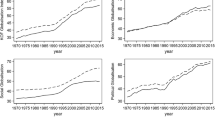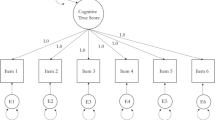Abstract
The introduction of fuzzy-sets into social science has potentially improved our ability to study diversity by means of the so-called partial memberships. As a consequence, social phenomena can be studied empirically as a matter of degree and not longer as fixed types. A fuzzy-set is a set with elements whose membership grades can have any real value between 0 and 1. In order to illustrate the capacities of the fuzzy set logic and also to make the discussion less abstract, it will be applied to the study of welfare state reforms. The ‘grading capacity’ of fuzzy-sets makes it possible to study welfare states as partial members of different welfare state regimes at the same time. This approach reveals the diversity of welfare reforms better than traditional ways which are often inclined to picture a case as representative of one particular type which is a too crude classification. Fuzzy-sets are designed to capture the diversity in a way that leaves more room to map individual cases without falling into the trap of idiosyncrasy. An equally important ability of fuzzy-sets is to analyse causal relationships in a small-n design. The fuzzy-set logic can be used to determine necessary and sufficient conditions for an outcome. This takes the form of expressions which reveal multiple-conjunctural causation patterns. In this paper the conditions for welfare cutbacks and the effects on socio-economic performance will be examined.
Similar content being viewed by others
References
Armingeon K., Beyeler, M., Menegale, S. (2002). Comparative political data set 1960–2000. Available at: http://www.cx.unibe.ch/ipw/download/ka/download_ka.html.
F.G. Castles (2002) ArticleTitleDeveloping new measures of welfare state change and reform European Journal of Political Research. 41 613–641 Occurrence Handle10.1111/1475-6765.00024
G. Esping-Andersen (1990) The Three Worlds of Welfare Capitalism Polity Press Cambridge.
G. Esping-Anderson K. Kersbergen van (1992) ArticleTitleContemporary research on social democracy Annual Review of Sociology. 18 187–208 Occurrence Handle10.1146/annurev.so.18.080192.001155
Franzese, R. (2001). The political economy of public debt: An empirical examination of the OECD postwar experience (*.PDF) Version presented to the Workshop on Political Economy at the Berglas School of Economics at Tel Aviv University, 30–31 January 2001. Avilable at: http://www-personal.umich.edu/∼franzese/Publications.html.
Evelyne Huber Stephens. John D (2001) Development and Crisis of the Welfare State Parties and Policies in Global Markets. The University of Chicago Press Chicago and London.
T. Iversen T. Cusack (2000) ArticleTitleThe Causes of welfare state expansion. Deindustrialization or globalization World Politics. 52 313–349
T. Janoski A.H. Hicks (Eds) (1994) The Comparative Political Economy of the Welfare State Cambridge University Press Cambridge.
H. Kitschelt (2001) Partisan competition and welfare retrenchment: When do politicians choose unpopular policies? P. Pierson (Eds) The New Politics of the Welfare State. Oxford University Press Oxford 265–302
H. Kitschelt P. Lange G. Marks J.D. Stephens (Eds) (1999) Continuity and Change in Contemporary Capitalism Cambridge University Press Cambridge.
G.J. Klir B. Yuan (1995) Fuzzy-sets and Fuzzy Logic Prentice Hall New Jersey.
M.A. Kleinman (2002) A European Welfare State? European Union Social Policy in Context Palgrave Houndmills.
S. Kuhnle (Eds) (2000) Survival of the European Welfare State Routledge London.
J. Kvist (1999) ArticleTitleWelfare reform in the nordic countries in the 1990s: Using fuzzy-set theory to assess conformity to ideal types Journal of European Social Policy. 9 231–252
J.-E. Lane S. Ersson (2002) Government and the Economy A Global Perspective. Continuum London and New York.
S. Leibfried H. Obinger (2001) Welfare State Futures An Introduction Cambridge University Press Cambridge
A. Lindblom (2001) ArticleTitleDismantling the social democratic welfare model? Scandinavian Political Studies. 24 171–193 Occurrence Handle10.1111/1467-9477.00052
J. Myles (1996) When markets fail: Social welfare in Canada and the United States G. Esping-Andersen Gosta (Eds) Welfare States in Transition. Sage London 116–140
OECD (2001). OECD Social Expenditure Database, 1980–1998, 3rd edn. Available at:www.oecd.org/els.
P. Pennings (1999) ArticleTitleEuropean social democracy between planning and market: A comparative exploration of trends and variations Journal of European Public Policy. 6 743–756 Occurrence Handle10.1080/135017699343351
P. Pennings (2003) ArticleTitleBeyond dichotomous explanations: Explaining constitutional control of the executive with fuzzy-sets European Journal of Political Research. 42 541–568 Occurrence Handle10.1111/1475-6765.00095
P. Pierson (1994) Dismantling the Welfare State? Reagan, Thatcher, and the Politics of Retrenchment Cambridge University Press Cambridge.
Ch. Pierson (1998) Beyond the Welfare State? The New Political Economy of Welfare Polity Press London.
Ch. Ragin (1987) The Comparative Method Moving Beyond Qualitative and Quantitative Strategies. University of California Press Berkeley, Los Angeles, London
Ch. Ragin (2000) Fuzzy-Set Social Science The University of Chicago Press Chicago and London.
Rieger E., Leibfried, S. (2001). Grundlagen der Globalisierung. Perspektiven des Wohlfahrtstaates. Frankfurt a.M. : Suhrkamp.
B. Rothstein (2000) The Future of the universal welfare state: An institutional approach Kuhnle Stein (Eds) Survival of the European Welfare State. Routledge London 217–233
E. Scarbrough (2000) ArticleTitleWestern European welfare states: The old politics of retrenchment European Journal of Political Research. 38 225–259 Occurrence Handle10.1023/A:1007153428153
F.W. Scharpf (2000) ArticleTitleThe viability of advanced welfare states in the international economy: Vulnerabilities and options Journal of European Public Policy. 7 190–228 Occurrence Handle10.1080/135017600343160
M.G. Schmidt (1992) Regierungen: Parteipolitische Zusammensetzung M.G. Schmidt (Eds) Lexikon der Politik B and 3: Die Westliche Länder C.H. Beck München 393–400
M. Smithson (1987) Fuzzy Set Analysis for Behavioral and Social Sciences Springer-Verlag New York, Berlin, Heidelberg.
J.D. Stephens (1996) The Scandinavian welfare states: Achievements, crisis, and prospects G. Esping-Andersen (Eds) Welfare States in Transition. Sage Publications London 32–65
D. Swank (2001) Global Capital, Political Institutions, and Policy Change in Developed Welfare States Cambridge University Press Cambridge.
K. Van Kersbergen (1995) Social Capitalism: A Study of Christian Democracy and the Welfare State Routledge London
Author information
Authors and Affiliations
Corresponding author
Rights and permissions
About this article
Cite this article
Pennings, P. The Diversity and Causality of Welfare State Reforms Explored with Fuzzy-Sets. Qual Quant 39, 317–339 (2005). https://doi.org/10.1007/s11135-004-5006-x
Issue Date:
DOI: https://doi.org/10.1007/s11135-004-5006-x




